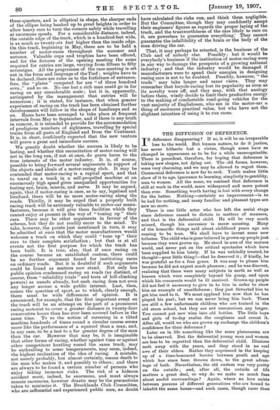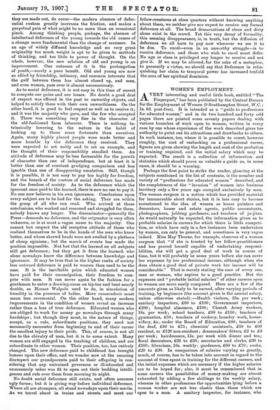THE DIFFUSION OF DEFERENCE.
IS deference disappearing? If so, it will be an irreparable loss to the world. But human nature, to do it justice, has never hitherto lost a virtue, though some have so changed in appearance as to be for a while unrecognisable. There is precedent, therefore, for hoping that deference is taking new shapes, not dying out. The old forms, however, were very charming, and we may be allowed to regret them. Ceremonial deference is now far to seek. Youth makes little show of it to age, ignorance to learning, simplicity to gentility, men to women. All the same, we contend that deference is still at work in the world, more widespread and more potent than ever. Something worth having is lost with every change for the better. Nothing—certainly no improvement—is to be had for nothing, and many familiar and pleasant types are now no more.
There is one little actor who has left the social stage since deference ceased to dictate in matters of manners, and that is the deferential child. He will be very much missed, though his successor is more amusing. Many of the honorific things said about childhood years ago are ceasing to be true. We shall have to invent some new tributes. The child who is gone believed in grown-up people just because they were grown up. He stood in awe of the mature world, and never put on the critical spectacles which have been supplied to him lately. If he was unkindly treated, be thought—poor little thing !—that he deserved it ; if kindly, he was grateful as for a free grace. It was easy to please him because he did not expect much pleasure ; and be was discreet, realising that there were many subjects in earth as well as heaven which were completely beyond his grasp, and upon which his comments would be ill received. Grown-up people did not feel it necessary to give in to him in order to show him an example of unselfishness ; they just thwarted him to get him used to it. We must applaud Lim now that he has played his part; but we can never bring him back. There are still a few unfortunate children who are trained in the old stern school, but they are not unconscious any longer. You cannot put new wine into old bottles. The little boys and girls of to-day realise the roughness and resent it. After all, would we who are grown up exchange the children's confidence for their deference ?
Later on in life something like the same phenomena are to he observed. But the deferential young man and woman are less to be regretted than the deferential child. Elusions melt away with the years, and they stood in no real awe of their elders. Rather they acquiesced in the keeping up of a time-honoured barrier between youth and age which has since been thrown down, to the great advan- tage of Loth. Nevertheless, the old custom was very pretty on the outside ; and, after all, the outside of life matters a great deal, or why do we make so much fuss about sordid surroundings ? Again, where no love exists between persons of different generations who are bound to inhabit the same house—and such cases, though rarer than
they are made out, do occur—the modern absence of defer- ential custom greatly increases the friction, and makes a perpetual pain of what might be no more than an occasional pinch. Among thinking people, perhaps, the absence of intellectual deference of the young towards the old comes of a change more fundamental than the change of manners. In an age of widely diffused knowledge and no very great originality too much weight is apt to be given to methods of thinking, and too little to power of thought. On the whole, however, the new relation of old and young is an improvement. One outcome of it is the prolongation of youth,—surely a pure benefit. Old and young are now so allied by friendship, intimacy, and common interests that the gulf between them has almost closed up, and men, and even women, pass over it almost unconsciously.
As to social deference, it is not easy in this time of unrest to compute our gains and our losses. No doubt a good deal of respect was offered in the past to unworthy objects, and helped to satisfy them with their own unworthiness. On the other hand, it is good to feel respect as well as to receive it; and it was the majority who gave, and the few who accepted it. There was something very fine in the character of the old-fashioned farm labourer. There is nothing in- trinsically lowering to the nature in the habit of looking up to those more fortunate than ourselves. Again, many highly placed people were made better and more bumble by the deference they received. They were expected to act nobly and to set an example, and the thought of their responsibility steadied them. An attitude of deference may be less favourable for the growth of character than one of independence, but at least it is better than one of constant grudging comparison and less ignoble than one of disapproving emulation. Still, though it is possible, it is not easy to pay too highly for freedom, and the breach of the custom of social deference has made for the freedom of society. As to the deference which the ignorant once paid to the learned, there is now no one to pay it. No one now believes in his own ignorance. Conclusions upon every subject are to be had for the asking. They are within the grasp of all who can read. Who arrived at those conclusions, who worked and reasoned and struggled for them, nobody knows any longer. The disseminator—generally the Press—demands no deference, and the originator is very often unknown, or is at most a vague name to the majority. One cannot but respect the old receptive attitude of those who realised themselves to be in the hands of the men who knew better, and whose shrewd heads were not swelled by a plethora of cheap opinions ; but the march of events has made the position impossible. Not but that the learned on all subjects still get deference ; but they get it from the learned, who alone nowadays know the difference between knowledge and ignorance. It may be true that in the higher ranks of society less outward deference is paid to women than used to be the case. It is the inevitable price which educated women have paid for their emancipation, their freedom to com- pete with men. It can never again be the fashion for a gentleman to enter a drawing-room on tip-toe and bent nearly double, as Horace Walpole used to do, in simulation of humility in the presence of ladies. More camaraderie must mean less ceremonial. On the other hand, many modern improvements in the condition of women reveal an increase rather than a loss of true deference. Educated women who are obliged to work for money go nowadays through many hardships ; but though they must, in the nature of things, accept, as a rule, subordinate positions, they need not necessarily encounter from beginning to end of their career the smallest injury to their pride. This, of course, is not all due to the chivalry of men, but it is to some extent. Many women are still engaged in the teaching of children, and are subordinate to other women. Their position, too, has entirely changed. The new deference paid to childhood has brought honour upon their office, and we wonder now at the amazing disrespect our grandparents paid to their offspring in con- sidering that any untrained governess or ill-educated and unmannerly usher was fit to open out their budding intelli- gences and rule over them from morning to night.
No doubt social deference still exists, and often assumes ugly forms; but it is giving way before individual deference.
Where all are strangers, all stand nowadays upon their merits. As we travel about in trains and streets and meet our fellow-creatures at close 'quarters without knowing anything about them, we neither give nor expect to receive any formal deference at all. The broad demarcations of clean and dirty alone exist in the crowd. Yet this very decay of formality, this seeming disappearance, is, in truth, but the diffusion of deference we all have to pay now wherever we see it to be due. To excel—even in an unworthy struggle—is to receive deference, and those who wish to excel must defer. No age or class is privileged any longer to receive and not give it. If we may be allowed, for the sake of a metaphor, to personify a virtue, we should say that Deference in relin- quishing her claim to temporal power has increased tenfold the area of her spiritual dominion.







































 Previous page
Previous page